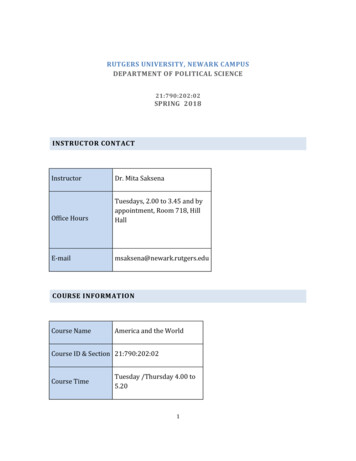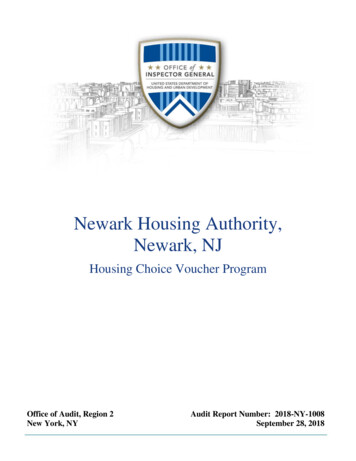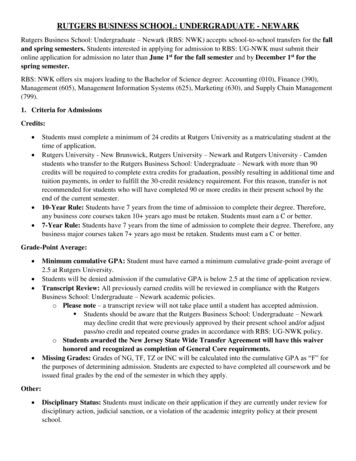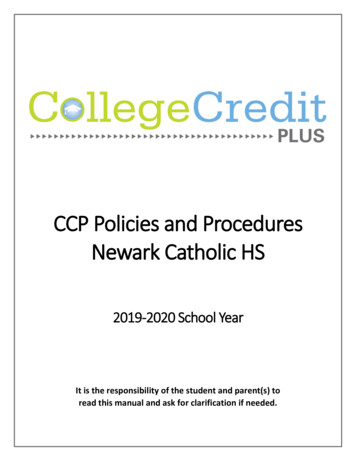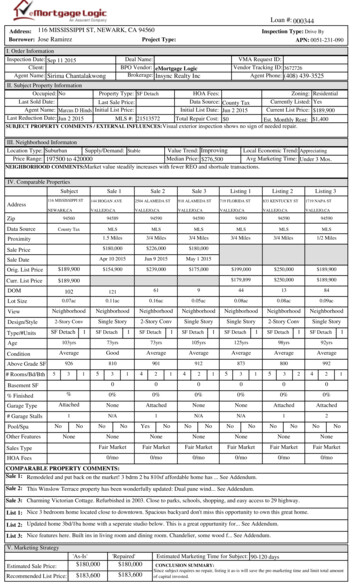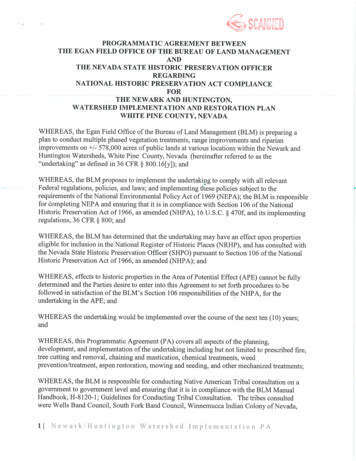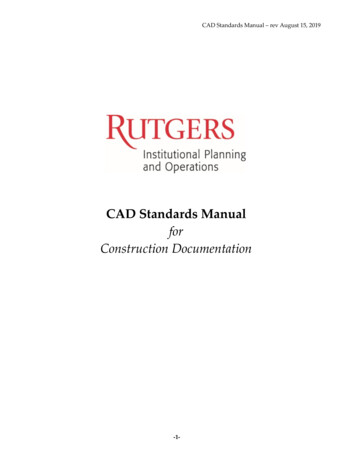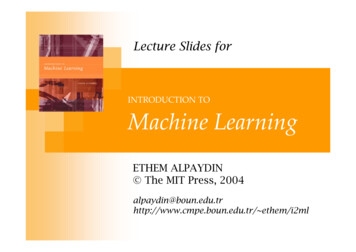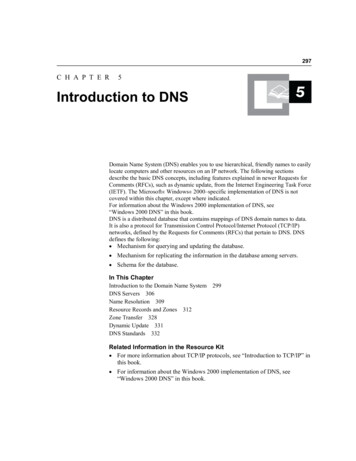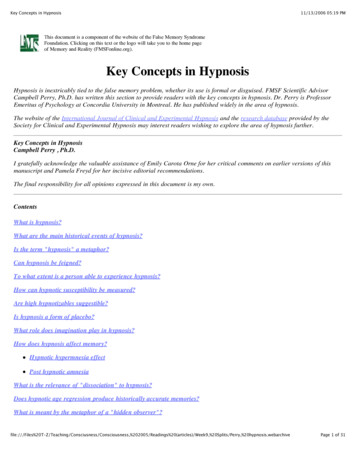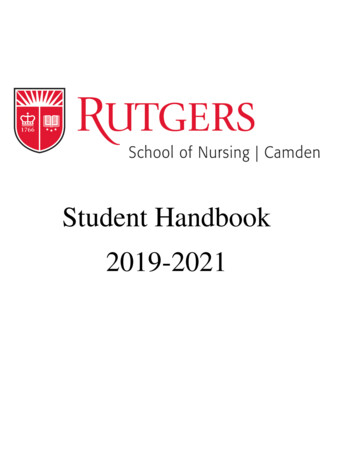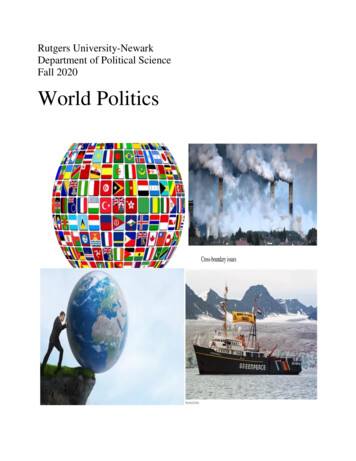
Transcription
Rutgers University-NewarkDepartment of Political ScienceFall 2020World PoliticsCross-boundary issues
Dr. James AmemasorCourse Number:21:790:321:01Course Location:VirtualClass Time:Tues. 2:30-5:20 P.M.Office:VirtualOffice Hour:Tues 1:30-2:30 P.M. (and by appointment)Email:jamemas@newark.rutgers.edu2
Course Description and ObjectivesWorld Politics is about how the countries and people of the world get along. For the past 372 yearsor so, the modern world has been increasingly divided up into nation-states. This division has led tothe development and growth of a particular kind of politics, different from "domestic" politics, andusually referred to as International Relations. This distinction between politics "inside" the state andpolitics "outside" the state has become deeply entrenched in our understanding of the modern world.This course offers an introduction to the study of World Politics. We will examine the core conceptsand theories that scholars use to explain the dynamics of this subfield of Political Science and willdo so by exploring a diverse set of expectations about actors' interests and the different institutionsthat shape their interactions. The complex patterns of such relations will be examined, with a focuson the roles of national and international institutions, transnational organizations, and civil society.The course is divided into five sections. The first section presents an overview of the evolution ofthe modern world. The second part examines the central puzzles associated with internationalsecurity and explores why the international community finds it hard to cooperate to prevent wars.This section also examines the activities of non-state actors, including rebel groups and terroristorganizations. The third section explores the main puzzles in international economic relations,including trade, financial, and monetary relations. The last two sections deal with transnationalissues and processes as well as the challenges associated with global governance. We will examinethe development of international law and norms and give attention to efforts that address threats tothe global environment. Students are expected to keep abreast of current events and how theyimpact world politics in order to better understand the information presented in class.Learning GoalsThis course is designed to help students:ObjectiveA. Understand that world politics spans the continuum from openwarfare to peaceful cooperation over issues and resources.B. Demonstrate understanding of the complexities of the global issuesthat produce relations and interactions among diverse actors.C. Recognize that the traditions of realism, liberalism, constructivism,and critical approaches to world politics can be understood as a setof assumptions about interests, interactions, and institutions.D. Demonstrate understanding of the evolving relations among criticaltransnational actors and the global issues that shape such relations.E. Enhance their analytical skills through the study of how the conceptsof interests, interactions, and institutions shape the priorities andbehavior of nation-states and other actors in our global system.F. Develop understanding of the relationship between theory and policymaking or problem solving in world politics.G. Develop the habit of applying new scholarly information learned inclass to the problems of the day in logical analyses.3AssessmentClass discussion andwritten assignmentsCourse Term Paperand class discussionsMid-term, Final, andTerm PaperClass Discussions,written assignmentsWritten assignmentsOral Presentationsand Term PaperClass Discussions
Required TextJeffry A. Frieden, David A. Lake, and Kenneth A. Schultz, World Politics: Interests, Interactions,Institutions, 4th ed. (New York and London: W. W. Norton & Company, 2019), ISBN9780393675092, available for purchase from Rutgers University-Newark Bookstore https://newarkrutgers.bncollege.com/shop/BNCB TextbookDetailView?displayStoreId 30058&urlRequestType Base&catalogId 10001&productId 600010922795&langId 1&partNumber DGC 5026390 PRODUCT&storeId 30058§ionId 97412472&item NSupplementary ReadingsIn addition to the text selected for this course, students will be required to examine book chapters aswell as journal articles and newspaper clippings provided as supplementary readings for a broaderunderstanding and integration of the topics and themes discussed in class. Most of these materialsare available in electronic format in the course's Canvas page; others are available online. Thesupplementary materials are taken from scholarly journals, magazines, and newspapers, includingForeign Policy, Journal of Politics, International Organization, Financial Times, Atlantic Monthly,New York Times, BBC News, Washington Post, Harvard International Review, and Journal ofInternational Affairs.Course Requirements and Grades1) Readings are assigned for each class session. It is imperative that students complete allrequired readings on time in order to be able to participate actively in class discussions. Allreadings will provide background information on the topics and themes presented in thecourse. Class discussions are an important part of the learning process. That along withstudent participation will be highly valued by the instructor.2) As part of your class participation, students are encouraged to read reputable magazine and/ornewspaper (e.g., New York Times) articles that reflect global trends and developments inworld politics. The instructor will randomly call upon students to summarize their articlesorally. Students are expected to relate their summaries to the core concepts of interests,interactions, and institutions.3) Regular attendance is a course requirement. Please note that more than two unexcusedabsences will draw a penalty on the participation portion of your grade.4) Starting from the second week, a team of 2-3 students will open class sessions with a 15-20minute oral presentation based on assigned readings. The presenters will be required to surveywhat they think are the most significant dimensions of the readings and to present the classwith a series of points for discussion.5) Midterm and Final Exams: The midterm exam will be held on Tuesday, October 13. The finalexam will take place during the time period assigned per the Fall 2020 Exam chedule-fall-2020-0. Please note that materials from assigned readings along withinformation presented in class lectures and discussions will be the subject of both the midtermand final exams. The nature and format of the exams will be discussed in detail later in thesemester.6) Term Paper: The due date for the term paper (no more than 10 double-spaced typed pages, notincluding the bibliography) is Tuesday, December 8. Students are required to submit a4
preliminary one-page proposal on a topic of their choice within the realm of world politics,which must be approved by the instructor. The proposal is due on Tuesday, November 10. Itwill not be graded, but rather returned with comments. The term paper must have a coverpage, title, and abstract. All written assignments for this class are to be in Times New Roman,12-point font with one-inch margins. No space is to be left between paragraphs, which are tobe indented on the first line. Details of the term paper assignment are available in in thecourse's Canvas page.The final grade earned in this course will be based on student performance in these areas:a.)b.)c.)d.)e.)f.)Class Participation – 10%Oral Presentations – 10%Quizzes – 10%Midterm Exam – 20%Term Paper – 30%Final Exam – 20%Please note that make-ups for missed exams as well as extensions for the term paper will only begranted with a valid and documented excuse, subject to the instructor's approval.Grade Scale for Tests, Papers, and Final Grade Assignments90-100 A 85-89 B 80-84 B75-79 C 70-74 C59-69 D 59 FFor information regarding important semester dates (e.g., University Academic Calendar and FallExams Schedule), see -calendar.Course FormatClass meetings are divided into lectures and class discussions. These two formats are intended tocomplement each other and are both integral parts of the course. The lectures provide context tohistorical themes, events, and global trends and processes. As such, they will provide context forstudents' consideration. Class discussions are designed to support the lectures. Thus, students shouldattend classes and actively participate in the learning process.Academic IntegrityAs scholars of Rutgers University-Newark, all students are held to the university's AcademicIntegrity and Student Conduct Codes as well as to their instructor's expectations, which include NOengaging in obscene or offensive behavior and NO utilizing inappropriate language or profanity. Asan academic community dedicated to the creation, dissemination, and application of knowledge,Rutgers University is committed to fostering an intellectual and ethical environment based on theprinciples of academic integrity. Academic integrity is essential to the success of the University'seducational and research missions, and violations of academic integrity constitute serious offensesagainst the entire academic community. Academic dishonesty and/or plagiarism on term papers andexams will not be tolerated and may result in an immediate and final course grade of "F." Pleasenote that such cases will be reported to the Chair of the Political Science Department, and mayresult in a lowered or failing grade for the course and up to possible academic probation and/orsuspension from the University. See Academic Integrity Policy at Rutgers University athttp://academicintegrity.rutgers.edu.5
Policy on InclusivenessIt is the policy and practice of Rutgers University-Newark to promote inclusive learningenvironments. If you have a documented disability, you may be eligible for reasonableaccommodations. In order to receive such accommodations, you must complete and submit theRegistration Form along with the appropriate documentation. Please note that students are notpermitted to negotiate any applicable accommodations directly with their professors. To requestaccommodations or assistance, please self-identify with the Office for Disability Services-Newark(ODS), Robeson Campus Center, Suite 219, at the beginning of the semester. For more informationor to register for services, please be sure to contact ODS at (973) 353-5375 or by email atODS@newark.rutgers.edu.Policy on IncompletesIncompletes will be given only in exceptional cases. Students wishing to request a grade ofIncomplete must provide documentation to support the request, accompanied by an IncompleteGrade Extension Form (available from the Department of Political Science Main Office), to theprofessor before the date of the final examination. If the request for an incomplete is approved, theprofessor reserves the right to specify the new submission date for all missing coursework. Studentswho fail to submit the missing course work within this time period will receive a failing grade forall missing coursework and a final grade based on all coursework assigned. Any Incomplete notresolved within one calendar year of receiving it, or by the time of graduation (whichever comesfirst), automatically becomes an "F." It is the responsibility of the student to make sure they havecompleted all course requirements within the time frame allotted. Please be aware that Incompleteson your transcript will impact financial aid and academic standing. This syllabus is subject to change and such a change will be announced to students. Pleasenote that students are responsible for keeping track of all announcements and assignments.Schedule of ClassesWeek 1: Introductions to the CourseTues., Sept. 1: Introductory MeetingRead: Jack Snider, "One World, Rival Theories," Foreign Policy (Dec. 2004): 52-62.Editors, "What Does the World Health Organization Do"? Council on ForeignRelations, June 1, 2020. Available from alth-organization-doYu-Jie Chen and Jerome A. Cohen, "Why Does the WHO Exclude Taiwan," Councilon Foreign Relations, April 9, 2020. Available from aiwanStanley Kao, "Taiwan Wants to Help Fight the Coronavirus. WHO Won't Let It,"Foreign Policy ronavirus-chinainternational-organizations/6
"172 Members Push for Taiwan’s Participation at the World Health Assembly,"Available from ART ONE: FOUNDATIONSWeek 2: What Shaped Our World? A Historical IntroductionSept. 8: Read: Read Frieden, et al., "Introduction" and Chapter 1.Read Blake Smith, "Slavery as Free Trade," Aeon, June 29, 2016. Available z-faire-economists-loved-slaveryWilliam Dalrymple, "Lessons for Capitalism from the East India Company,"Financial Times, August 29, 2019.Week 3: Understanding Interests, Interactions, and InstitutionsSept. 15: Read Frieden, et al, Chapter 2.Carmen Gebhard, "One World, Many Actors: Levels of Analysis in InternationalRelations;" an excerpt from Stephen McGlinchey (ed.), International Relations, EBook tors/Javier C. Hernández, "U.S. and Iran Are Trolling Each Other—in Asia," New YorkTimes, January 16, 2020.PART TWO: WAR AND PEACEWeek 4: Why are there Wars?Sept. 22: Read Frieden et al., Chapter 3.Uri Friedman, "Donald Trump Sorrowfully Cancels Another North Korea Meeting,"The Atlantic Monthly, August 24, 2018.Joseph Yun, "How the U.S. and North Korea Can Break the Cycle ofDisappointment," Washington Post, August 15, 2018.For information on significant conflicts around the world, see "Global ConflictTracker" on Council on Foreign Relations flict-tracker#!/global-conflict-trackerBBC News, "Russia and US warships almost collide in East China ek 5: Domestic Politics and WarSept. 29: Read Frieden et al., Chapter 4.Uri Friedman, "Syria's War Has Never Been More International," The AtlanticMonthly, February 14, 2018.Nour Samaha, "The Black Market Kings of Damascus," The Atlantic Monthly,October 3, 2016.7
David E. Sanger and David D. Kirkpatrick, "In Face-Off with Iran, Escalation MayDepend on Who Prevails Inside Washington and Tehran," New York Times, June 15,2019.Week 6: International Institutions and WarOct. 6: Read Frieden et al, Chapter 5.Terrence L. Chapman and Scott Wolford, "International Organizations, Strategy, andCrisis Bargaining," The Journal of Politics, Vol. 72, No. 1 (January 2010): 227-242.Jimmy Carter, "In Syria, an Ugly Peace is Better than More War," New York Times,August 24, 2018.BBC News, "INF Nuclear Treaty: NATO 'to Avoid Arms Race' after US-Russia PactEnds" https://www.bbc.com/news/world-europe-49207281 (accessed August 2,2018).Week 7: Violence by Non-state Actors: Civil War and TerrorismOct. 13: Read Frieden et al, Chapter 6.Eeben Barlow, "The Rise and Fall of – and Rise Again of Boko Haram," HarvardInternational Review, Vol. 37, Issue 4 (Summer 2016): 16-20."The Origins of Boko Haram," New African, Issue 583 (May 2018): 31-33.Tuesday Oct. 13: Midterm ExamPART THREE: INTERNATIONAL POLITICAL ECONOMYWeek 8: International TradeOct. 20: Read Frieden et al, Chapter 7.David Leonhardt, "What Americans Don't Understand About China's Power," NewYork Times, January 16, 2020.Liu Xiaoming, "Brics Countries Show the US the benefits of Globalization,"Financial Times, August 20, 2018.James Politi and Peggy Hollinger, "US Hits EU Goods with New Tariffs after WTORuling,” Financial Times, October 2, 2019.Peggy Hollinger, "What is at Stake in WTO Ruling on Airbus-Boeing TradeDispute,” Financial Times, October 2, 2019.Week 9: International Financial RelationsOct. 27: Read Frieden et al, Chapter 8.Mohamed A. El-Elrian, "The Future of Economic and Financial Globalization,"Journal of International Affairs, Special Issue, Vol. 70 (2017): 1-6.8
Week 10: International Monetary RelationsNov. 3: Read Frieden et al., Chapter 9.Colby Smith, Eva Szalay and Katie Martin, "Dollar Blues: Why the Pandemic isTesting Confidence in the U.S. Currency," Financial Times, July 31, 2020.John Plender, "Global Liquidity Squeeze Looks to Continue," Financial Times,August 20, 2018.Week 11: Development: Causes of the Wealth and Poverty of NationsNov. 10: Read Frieden et al, Chapter 10.Read William Easterly, "Development in a Time of Xenophobia," Journal ofInternational Affairs, Special Issue, Vol. 70 (2017): 1-6David Pilling, "Africa Poised 'to Play a Major Role in the World,'" Financial Times,August 28, 2019.Tues., Nov. 10: Term paper proposal dueWeek 12: Discussion of Term Paper ProposalsNov. 17: Presentation and Discussion of Term Paper proposalsWe will use this meeting to discuss your term paper proposals, the goal of which is tocreate space for your peers to provide feedback on one another's proposal.PART FOUR: TRANSNATIONAL POLITICSWeek 13: International Law and NormsNov. 24: Read Frieden et al, Chapter 11.Week 14: Human RightsDec. 1: Read Frieden et al, Chapter 12.Rana Mitter, "Five Ways China’s Past has Shaped Its Present," 279Richard C. Paddock, "U.N. Court Orders Myanmar to Protect Rohingya Muslims,"New York Times, January 23, 2020.Zeid Ra’ad Al Hussein, "I Will Not Stay Silent. Our Leaders are Failing HumanRights," New York Times, May 6, 2019. Available 6306143/un-human-rightsviolations.htmlPART FIVE: LOOKING AHEADWeek 14 & 15: The Global Environment & the Future of International Politics9
Dec. 8: Read Frieden et al, Chapters 13 & 14.Erle C. Ellis, "Science Alone Won’t Save the Earth. People Have to Do It," New YorkTimes, August 11, 2018.David A. Graham, "Can Anyone Fill the U.S. Leadership Vacuum on ClimateChange?" The Atlantic Monthly, June 25, 2018.Lisa Kaltenegger, "Is Earth the Only Living Planet?" Financial Times, August 30, 2019.Clifforf Krauss, David Taffe-Bellany and Maria Simões, "Why Amazon Fires Keep Raging10 Years After a Deal to End Them," New York Times, October 18, 2019. The article comeswith an important 10-minute video.Dec. 8: Term Paper DueDecember 11-14: Reading DaysFall Exams begin December 15, 2020World Politics Final Exam: December 1510
The third section explores the main puzzles in international economic relations, including trade, financial, and monetary relations. The last two sections deal with transnational . Rutgers University is committed to fostering an intellectual and ethical environment based on the principles o
